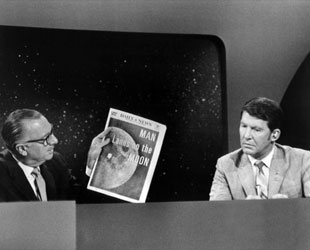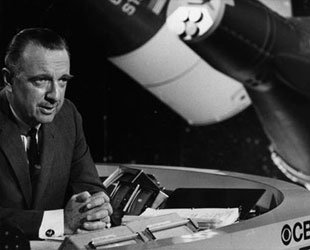July 17, 2009 — Veteran television news anchor Walter Cronkite, who chronicled the rise of the American space program and in particular, the success of the first manned moon landing in 1969, died Friday (July 17) at age 92.
A former CBS anchor who was once named "the most trusted man in America," Cronkite died at his home in New York while surrounded by family after a long illness, according to the Associated Press.
Cronkite was already a veteran journalist before taking the helm at the "CBS Evening News". His coverage of NASA spanned from the early manned missions to the beginning of the space shuttle era.
"It is with great sadness that the NASA family learned of Walter Cronkite's passing," said newly confirmed NASA Administrator Charles Bolden, a former space shuttle commander, in a statement. "He led the transition from print and radio reporting to the juggernaut that became television journalism. His insight and integrity were unparalleled, and his compassion helped America make it through some of the most tragic and trying times of the 20th century."
Forty years ago this week, during the Apollo 11 mission that landed the first men on the Moon on July 20, 1969, Cronkite provided marathon live coverage. He shouted "Go baby, go!" as a Saturn V launched astronauts Neil Armstrong, Buzz Aldrin and Mike Collins toward the Moon and spent 27 of the 30 hours following the lunar landing narrating the moonwalk for CBS.

Walter Cronkite, with astronaut Wally Schirra, displays the front page of the New York Daily News . (Retro Space Images) |
"From the earliest days of the space program, Walter brought the excitement, the drama and the achievements of space flight directly into our homes," Bolden said. "But it was the conquest of the Moon in the late 1960s that energized Walter most about exploration."
Bolden said that it was Cronkite's coverage of the Apollo 11 mission that helped inspire him to pursue a career in spaceflight. Bolden flew four times into space, twice as commander.
Cronkite anchored the "CBS Evening News" from 1962 to 1981. During that time, he chronicled the assassination of President John F. Kennedy, the space race between the United States and Soviet Union, and later the Vietnam War.
In a 1996 interview, Cronkite said "the whole period of the '60s changed a lot of us; there was never a decade like that in American history... to have the decade capture one of the great accomplishments of this century: man landing on the moon."
NASA honored Cronkite for his lifetime of work in 2006, naming him an Ambassador of Exploration -- an honor typically reserved for astronauts and employees -- and presenting him with a moon rock sample that he in turn presented to the University of Texas. He was to date the only non-NASA recipient of the award.
"I think that 500 years from now the young people that are living on space stations and space cities and perhaps on the orbs themselves out there... they will be recognizing the most important feat of all time," Cronkite said when he accepted the award. "500 years from now they will be celebrating the first landing on the moon and the first walk on the moon."

News anchor Walter Cronkite covered NASA missions from the Mercury missions through the space shuttle. (CBS News) |
Cronkite said that the moon landing left him speechless despite all of his preparation. He considered it an honor to have covered the pioneering days of space exploration and said he envied the journalists who would follow to report on the next phase of spaceflight.
"It's hard for us to really understand the immensity so far of the conquest of space," Cronkite said.
Named a semifinalist in NASA's 1986 Journalist-in-Space program in 1986, Cronkite's admiration for the astronauts was mutually felt. "He had a passion for human space exploration, an enthusiasm that was contagious, and the trust of his audience. He will be missed," said Armstrong in a statement.
Share your thoughts about Walter Cronkite and memories of his coverage with other collectSPACE readers.
Tariq Malik with SPACE.com contributed to this article.
